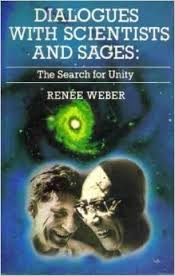 Reviewed by Edward N. Reynolds, Ph.D.
Reviewed by Edward N. Reynolds, Ph.D.
In JRT Issue 3, Spring 1987
Renee Weber says in her book, Dialogues With Scientists And Sages: The Search For Unity, “They have tried to talk me out of it repeatedly and over many years and from both sides of the spectrum — scientists and mystics — but it will not take root.” What will not take root for Weber is the accepted belief that there is a dichotomy between science and spirituality, between the life of objective investigation and the life of mysticism. Inspired in her youth by the work of the late Fritz Kunz and his journal Main Currents In Modern Thought, published between 1940 and 1975, Weber dedicates this volume to his memory, and he would be proud of her effort.
In this book Weber interviews contemporary scientists and mystics regarding their views on space, time, matter, energy, and life itself. She selects some of the greatest thinkers of our time, including quantum physicist David Bohm, whom she interviewed initially in 1978 in Ojai California, and subsequently in New York City, Princeton, London (with Rupert Sheldrake), and Switzerland (with his Holiness, the Dalai Lama). Others interviewed include Lama Govida, Father Bede Griffiths, Ilya Prigogine, Stephen Hawking, and Krishnamurti. Sheldrake and the Dalai Lama were both interviewed alone as well as with David Bohm. The interviews were conducted at various locations around the world between the late 1970s and the mid 1980s.
Weber introduces the book with a superb essay on her own personal search for unity in life. She also offers brief introductory comments in which she gives biographical and contextual material for each of the dialogues. Her sensitivity and depth of understanding are perhaps best illustrated in her introduction to her interview with the British physicist Stephen Hawking. Suffering from a progressive motor neuron disease called amyotrophic lateral sclerosis (ALS), Hawking is so disabled that he is barely able to move. Furthermore his speech is so distorted that he must use a translator. Weber did not dwell on his physical condition when interviewing him in England in mid-July 1985, yet she notes following their interview:
“In a sense more real than metaphorical Hawkins lives in the immensity of a space where magnitudes of 10QT are common, which his consciousness expands to explore and where his genius is energized and comes alive. In that subtler sense, his environment is far less confined than that of most of the people who run about on two legs.” (207)
The men interviewed in the book have not only differing, but in some cases conflicting, views of reality. Weber is firm, however, in her desire to explore great minds, rather than to support a specific dogma or orthodoxy She asks powerful, insightful, even brilliant questions, whether talking to David Bohm about the “implicate order,” Bohm’s term for the all-encompassing physical, psychological, and spiritual background of all experience, or talking with Father Bede Griffith about the power of darkness as a metaphor for God. (According to Father Griffith, God is hidden in the darkness of the unconscious.) While the interview style loses somewhat in terms of clarity and development of ideas, with it Weber brings to the reader a living sense of the person, which more than makes up for the loss. One question which emerges is why only men were interviewed for the book. Mother Theresa, for example, would have made a wonderful addition. Weber does not answer this question directly but notes in the epilogue that she wishes she had known earlier of the work of George Wald and Barbara McClintock, both biologists and Nobel laureates. Weber discovered their writings just as the volume went to press.
This is a difficult book because of its scope and because of the complexity of much of the material, but Renee Weber as scholar and writer, as scientist and mystic, makes it fascinating and rich. The reader is left in the final analysis with the feeling so well expressed by Weber’s friend and mentor Fritz Kunz, “The whole universe is one mathematical and harmonic expression, made up of finite representations of the infinite.”
ISBN-13: 978-0710206558
